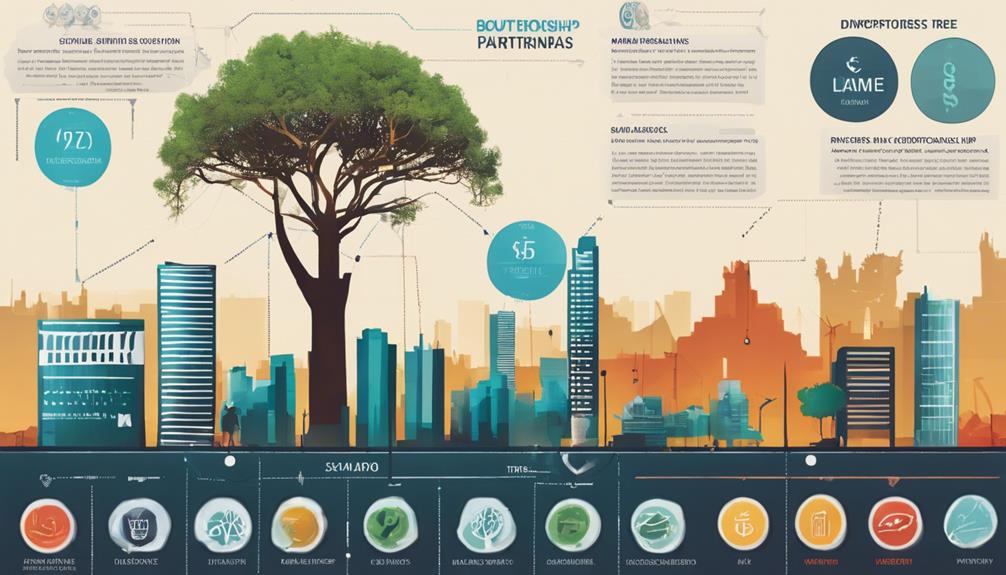In South Africa, you've got several enticing business structure options to explore. A sole proprietorship gives you full control but comes with personal liability for debts. If you're looking to collaborate, partnerships allow you to pool resources and share financial risks, though they also mean joint liability. For limited liability, contemplate a proprietary limited company, which protects your personal assets but has regulatory requirements. Public companies can access significant capital while facing complex compliance. Franchises offer brand support but limit operational flexibility. Each option serves unique needs, guiding you toward the best fit for your goals. There's much more to reflect on!
Key Takeaways
- Sole proprietorships allow for full control and quick setup but expose personal assets to business liabilities.
- Partnerships combine resources and skills, fostering collaboration while sharing financial risks and responsibilities.
- Proprietary limited companies (Pty Ltd) offer limited liability and protect personal assets, but require adherence to legal regulations.
- Public companies can raise substantial capital through share sales, but face complex regulations and management challenges due to shareholder influence.
Sole Proprietorship Overview
A sole proprietorship is the simplest business structure, allowing you to operate independently while enjoying full control and all profits. This type of business requires minimal setup, making it an attractive option for entrepreneurs like you who want to get started quickly.
You retain 100% ownership, which means you decide how to run your business and keep all earnings. However, it's crucial to understand that you're personally liable for any debts or obligations your business incurs. This means your personal assets could be at risk.
Many successful companies, including Amazon, began as sole proprietorships, demonstrating that this model can lead to significant growth. If you're ready to jump in, this structure might be the perfect fit for you.
Understanding Partnerships

Partnerships bring together two or more individuals who combine their resources and skills to operate a business collaboratively. This structure allows you to leverage the diverse expertise of each partner, enhancing your decision-making and problem-solving abilities.
You'll also share the financial burden, which can lead to better work-life balance. However, keep in mind that partnerships come with joint liability. If one partner incurs debt, all partners are responsible, which could put your personal assets at risk.
It's essential to establish clear agreements that outline each partner's roles, contributions, and the profit-sharing arrangement. When done right, a partnership can be a powerful way to grow a business while benefiting from the strengths of your co-owners.
Proprietary Limited Companies

When considering a business structure, a Proprietary Limited Company (Pty Ltd) offers the advantage of being a separate legal entity, which can protect your personal assets from business liabilities. This structure allows you to limit your financial risk while enjoying operational continuity.
Here's a quick comparison of key features:
| Feature | Advantages | Disadvantages |
|---|---|---|
| Legal Status | Separate entity; protects personal assets | Compliance with legal requirements |
| Liability | Shareholders not liable for debts | Personal liability in reckless cases |
| Financial Disclosure | No public disclosure of finances | Limited access to capital markets |
| Ownership | Shares can be transferred easily | Registration can be costly and complex |
| Management | Flexibility in management structure | Must adhere to company regulations |
Choosing a Pty Ltd can be a smart choice for many entrepreneurs in South Africa.
Public Company Insights

Public companies provide unique opportunities for growth and investment, but they also come with complexities that entrepreneurs should carefully consider.
By going public, you gain access to significant capital through share sales, allowing for expansion and innovation. However, this route requires maneuvering through intricate regulations and compliance obligations, which can be both time-consuming and costly.
You'll also face the challenge of making decisions in a more extensive environment, as numerous shareholders will have a stake in your business. In addition, transparency is essential; you'll need to disclose financial information and operational details, which may expose proprietary strategies.
Despite these challenges, the potential for increased market visibility and diversified risk makes public companies an appealing option for many entrepreneurs.
Franchise Business Model

Franchising offers a unique business model that allows you to leverage an established brand while receiving ongoing support and training.
As a franchisee, you benefit from a proven operational framework, which can reduce the risks associated with starting a new venture. You'll gain access to brand recognition and marketing resources, helping you attract customers from day one.
However, you need to follow the franchisor's rules and guidelines, which can limit your flexibility in business decisions. Initial investments can be significant, often requiring franchise fees and ongoing royalties.
Despite these challenges, franchises like McDonald's demonstrate the potential for success, providing a structured path for aspiring entrepreneurs. If you're seeking a supportive business environment, franchising could be a great fit for you.
Comparing Business Structures

Several business structures exist in South Africa, each with its own advantages and disadvantages that can greatly impact your entrepreneurial journey.
A sole proprietorship offers simplicity and complete control but subjects you to personal liability.
Partnerships bring shared resources and expertise, yet you face joint liability for debts.
A Pty Ltd provides limited liability and a separate legal identity, though it comes with more regulations and costs.
Public companies can access significant capital but require transparency and complex decision-making.
Franchises offer established brands and support but limit your operational freedom due to adherence to franchisor rules.
Each structure presents unique considerations, so weigh your options carefully to align with your business goals.
Choosing the Right Option

When deciding on a business structure, it's crucial to contemplate your specific needs, goals, and risk tolerance to find the best fit for your entrepreneurial journey.
If you're seeking full control and simplicity, a sole proprietorship might be your best choice.
For collaboration and shared expertise, consider a partnership.
If you prefer limited liability and a separate legal entity, a Pty Ltd could be ideal.
If you're looking to attract significant investment and scale quickly, a public company might suit your ambitions.
Alternatively, if you want to leverage an established brand, exploring franchising could be beneficial.
Evaluate each option carefully to guarantee it aligns with your vision and provides the right level of protection and support for your business.
Frequently Asked Questions
What Are the Tax Implications for Each Business Structure in South Africa?
When considering tax implications, you'll find sole proprietorships face personal tax rates, partnerships share profits and taxes, while Pty Ltd companies enjoy lower corporate rates. Public companies have more complex tax structures, influenced by shareholders and regulations.
How Does Each Structure Impact Personal Credit and Financing Options?
Imagine traversing a forest; your path's choice shapes your journey. Sole proprietorships risk personal credit, partnerships mix accountability, while Pty Ltd shields you. Public companies attract investors, but franchises limit flexibility, impacting your financing quest.
Can I Change My Business Structure Later if Needed?
Yes, you can change your business structure later if needed. Many entrepreneurs start small and shift to larger entities as they grow. Just make certain you follow the legal requirements for the new structure.
What Are the Ongoing Compliance Requirements for Each Option?
Each business structure has unique compliance requirements. You'll need to maintain records, file taxes, and adhere to regulations. Stay informed about deadlines and obligations to guarantee your business remains in good standing and avoids penalties.
How Do I Protect My Intellectual Property in Different Business Structures?
Guarding your intellectual property's like putting on armor; in a sole proprietorship, use trademarks and copyrights. In partnerships or companies, register your IP and establish clear agreements to shield your creations from prying eyes.
Conclusion
In the grand tapestry of South Africa's business landscape, each structure offers its own unique thread.
Whether you fancy the independence of a sole proprietorship or the camaraderie of a partnership, the choice is yours to make.
Embrace the protective embrace of a Pty Ltd or the expansive horizon of a public company.
With a sprinkle of creativity and a dash of strategy, you'll weave together a business journey that reflects your aspirations and dreams.
Choose wisely!









